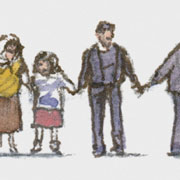We are living in an age of anger: from American 'shooters' and ISIS to Trump, from a rise in vengeful nationalism across the world to racism and misogyny on social media.
Renowned author and essayist Pankaj Mishra visits the RSA to discuss how and why we got to this point.
He shows that as the world became modern those who were unable to fulfil its promises - freedom, stability and prosperity - were increasingly susceptible to demagogues. The many who came late to this new world or were left, or pushed, behind, reacted in horrifyingly similar ways: intense hatred of invented enemies, attempts to re-create an imaginary golden age, and self-empowerment through spectacular violence.
Today, just as then, the wider embrace of mass politics, technology, and the pursuit of wealth and individualism has cast many more millions adrift in a demoralized world, uprooted from tradition but still far from modernity.


Join the discussion
Comments
Please login to post a comment or reply
Don't have an account? Click here to register.
Insightful interview, and I especially resonated with Pankaj Mishra's debunking of illusions, whilst connecting interdependence, suffering and compassion. Here's a complementary take on interdependence:
"As humanity's idea of itself changes, its social institutions and structures will change as well. Fundamentally, you will begin to see yourself as a member of your world, not simply as a member of a nation or of a group or of a religion or of a culture or of an extended family or of a political persuasion. All of these things will be overshadowed by the presence of the Greater Community, which will make them increasingly insignificant. As this realisation is passed from one generation to another, national interests will change, with a greater emphasis on interdependence with other nations and on mutual survival and well-being."
"Ultimately, the nations of the world will have to achieve a very high state of interdependence if they are to survive the Great Waves of change that are coming to the world—environmental degradation, diminishing resources, the loss of food production, the changing of climate and violent weather, the threat of pandemic illness and the threats of growing conflict, competition and war. Only a greater interdependence can make war unnecessary—interdependence based upon fundamental mutual needs."